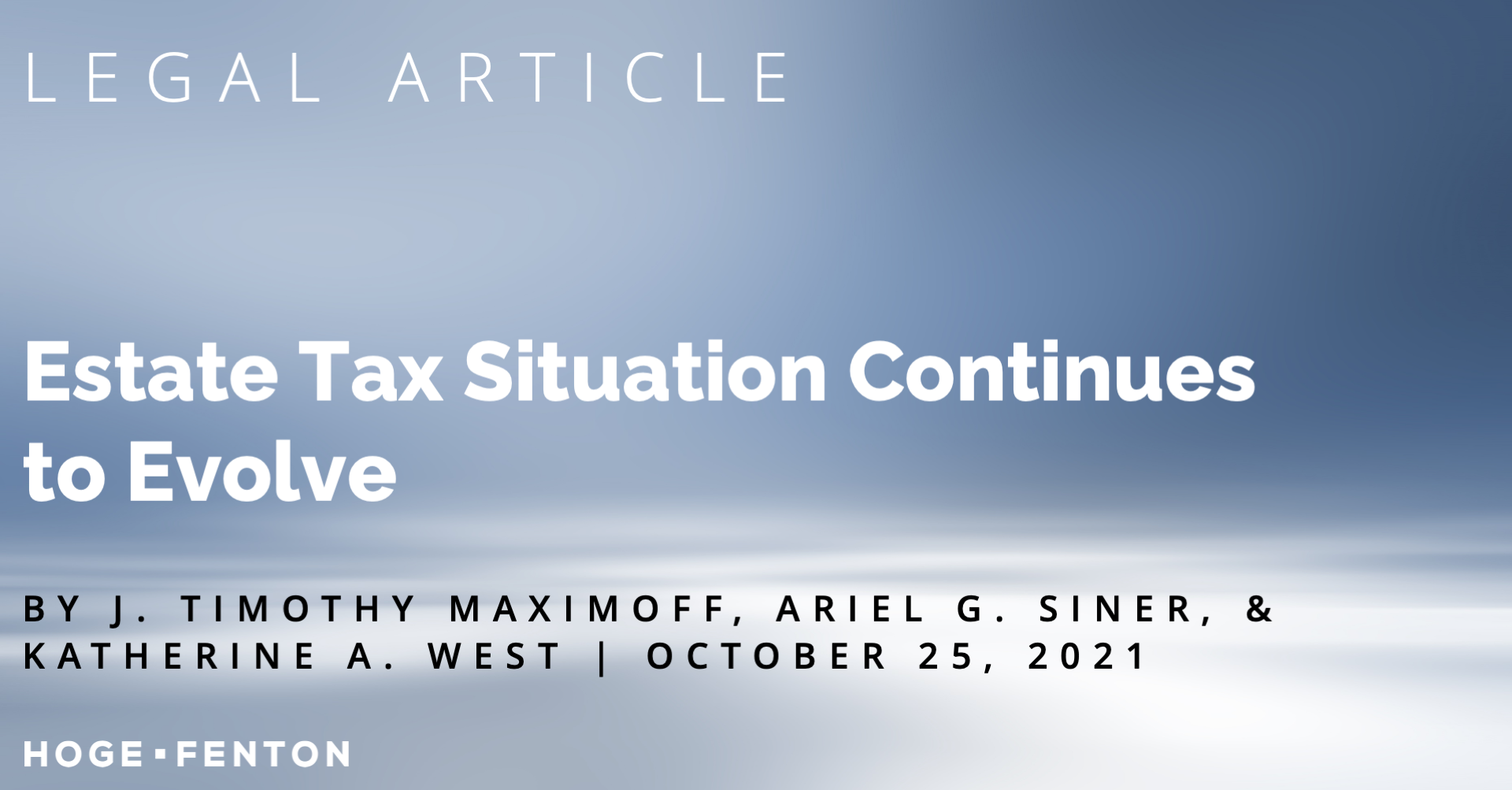Legal Article | Estate Tax Situation Continues to Evolve
By Hoge Fenton | 11.8.2021 | Estates and Trusts

NOTE: This article is based on legislation proposed in September, 2021. Congress released revised legislation on October 28 which removed the accelerated drop in estate exemption and grantor trust provisions discussed below. However, as of November 7, legislation has not been passed, and the initial proposals discussed below may come back in future bills.
Benjamin Franklin said that only two things in life are certain: death and taxes. While that may be true, we are currently living with uncertainty about taxes. For more than a year, politicians have discussed changes to taxes, including imposing a wealth tax, drastic changes to capital gains and basis rules, and changes to the gift and estate tax framework. And we know confidently now is that something is going to change, but what? In this piece we will mostly discuss some possible impacts on estate tax and related estate planning.
On Wednesday, September 15, 2021, the House Ways and Means Committee released a proposed bill that, if passed, would have a significant impact on many clients’ estate plans. Some proposals are to be effective January 1, 2022, while others would be effective immediately upon enactment (signing of a final bill). These initial proposals have been subject to debate in Washington for many weeks, and as of the writing of this article, we cannot know what tax increases will be in the final legislation, or the date legislation will be enacted or effective. However, it is likely some highly effective planning and gifting strategies may not be available for much longer, and other strategies will be impacted after passage.
The current federal gift and estate tax regime dates back to 2018. The gift, estate and generation-skipping tax exemption, which applies to gifts made during life and assets in a decedent’s estate at death, is $11.7M in 2021 and is adjusted each year for inflation. In 2026, the exemption returns to one half of the current amount (projected to be about $6M adjusted for inflation). Present gifts, or a future estate that exceed the available remaining exemption are taxed at a maximum transfer tax rate of 40%, which is extremely low when compared to historical estate tax rates.
Advisors have used many tried and true techniques to reduce the impact of estate tax on wealthy clients. Simple techniques have included the simple creation of a “bypass” trust at the first spouse’s death to use exemption. This is found in many older estate plans. Proactive planning has also included gifts or sales of assets to children and trusts (to remove those assets and future appreciation from the donor’s future estate). Advanced tools have included “dynasty trusts”, grantor retained annuity trusts (GRATs), intentionally defective grantor trusts (IDGTs), charitable remainder trusts (CRTs) and charitable lead trusts (CLTs), and irrevocable life insurance trusts (ILITSs). In addition, clients often take advantage of the reduced (“discounted”) valuation available for partial interests in property or in entities such as LLCs and partnerships. Some of these techniques would be impacted by legislative proposals.
The proposed House reconciliation bill includes an accelerated drop in the estate tax exemption to $5 million per person, adjusted for inflation, effective in 2022 instead of the current planned drop in 2026. The “extra” exemption will be lost if not used up in 2021, assuming clients are willing and able to make gifts of $5M or more to take advantage of the current high exemption before it is gone.
The proposed Ways and Means bill would also make changes to the rules concerning grantor trusts, effective immediately upon enactment. Grantor trusts have been powerful tax planning tools because the grantor (the creator of the trust) is treated as the owner of the trust assets for income tax purposes. As a result, assets transferred to the grantor trust can grow without erosion by income taxes (which are paid by the person creating the trust). The grantor can also sell appreciated assets to the grantor trust without triggering income tax, allowing for transactions between the trust and the grantor to be disregarded for income tax purposes because they are treated as the same income taxpayer. For example, assets can be sold or exchanged between the trust and grantor without triggering any capital gains recognition.
Common types of trusts with grantor trust treatment are grantor retained annuity trusts (GRATs), intentionally defective grantor trusts (IDGTs), qualified personal residence trusts (QPRTs), and most irrevocable life insurance trusts (ILITs).
Unfortunately for planning purposes, many of the benefits of grantor trusts could be negated under the proposed legislation as follows:
- Assets held in a grantor trust created after the effective date of the law would be part of the grantor’s taxable estate at death. Transferring assets to an existing grantor trust after the effective date would also no longer be effective to remove assets from the grantor’s estate.
- Transfers and sales to a grantor trust created after the effective date would trigger capital gains recognition. We understand that this treatment would also apply to transactions after the effective date with an existing (“grandfathered”) grantor trust. We also understand that the rule would apply to transfers of trust assets back to the grantor, which could impact the treatment of payments made from a GRAT to the grantor or installment sale payments from a grantor trust to the grantor who had previously sold assets to the trust to leverage their estate planning.
- Distribution from a grantor trust formed (or funded) after the effective date to beneficiaries would generally be treated as a taxable gift from the grantor at that time, using up any available gift tax exemption, or triggering gift tax at that time.
- If a grantor trust is formed or receives assets from a grantor after the effective date, and the trust’s “grantor trust” status ceases during the grantor’s lifetime (i.e. the grantor is no longer treated as the owner of the assets for income tax purposes), the trust assets would be treated as having been gifted by the grantor. Once again, such treatment would further use up the grantor’s lifetime exemption. If the grantor’s lifetime exemption is completely used up, any gifts would then be taxed to the grantor.
- Note that a revocable living trust is also a grantor trust, but these trusts are specifically not impacted by the proposed legislation.
These grantor trust changes are proposed to be effective upon signing of a final bill (subject to changes that may be made to the legislation). There is significant concern about the drastic application of these rules to transfers to or from insurance trusts (ILITs), GRATs and other vehicles which many clients already have in place. For example, under the initial proposal, part of an ILIT might be included in a client’s estate if contributions were made to the ILIT after the effective date. We understand the extent and application of the above rules is subject to intense lobbying in Washington, so whether the final legislation will impact these trusts is unclear at this time.
Other changes that, if implemented, would be effective on enactment are limitations on valuation discounts on transfers of partial interests in legal entities (such as on LLCs and partnerships) that hold non-business assets (such as securities and passive investment assets). There are also many proposals to raise income taxes and changes to the capital gains rate to keep in mind for tax planning.
On the bright side, other drastic tax changes discussed in Washington over the last year did not make it into the September 15, 2021 House Ways and Means Committee proposal. The “step up in basis” at death, wherein the cost basis of a capital asset is adjusted to fair market value as of the date of the owner’s death, is not affected by the current proposal. Additionally, earlier proposed increases in the maximum estate tax rates up to 65% were not included in the current bill. Proposals to limit the exemption for lifetime gifts to $1M and to limit the annual gift tax exclusion were similarly not included. Lastly, the proposal to impose a capital gain tax at death is not in the current proposed House bill. However, many of these drastic proposals are championed by influential members of Congress, so we may not have seen the last of these potential changes.
The proposed bill published by the House Ways and Means Committee is still subject to negotiation and reconciliation with the Senate. This process takes time. If the total cost of legislation is lowered, then some of the tax raising provisions discussed above may be limited or removed. However, we are confident that some changes will occur effective as of 2022, or earlier.
So where does all this leave us? If you think you will want to use some or all of your current $11.7M estate and gift tax exemption or are planning to use discount valuations or grantor trusts before the end of the year, talk to your advisors sooner rather than later, and agree on a plan even if it is not “implemented” immediately. Timing is important because there are many steps to implement a proper gifting plan. For example, you may need to decide on terms and trustees for large irrevocable trusts, select assets to transfer, evaluate related property and income tax issues, and obtain appraisals for gift tax purposes. In some cases, additional steps may be needed well ahead of the actual gift transfers. Keep in mind that attorneys, accountants and appraisers are getting very busy and if you wait, your advisor may not be able to assist you. Lastly, it is extremely difficult and risky to implement gifts or transactions in a rush.
Meet Our Team
 |
Ariel Siner works with clients to achieve their charitable, business succession, and wealth management goals using complex estate plans and trusts. She also assists in drafting pleadings for trust litigation matters. Additionally, she works with the firm’s Corporate Group in entity formation and dissolution, and mergers and acquisitions. |
 |
Katherine West’s practice focuses on the areas of estate planning, trust administration, probate and conservatorships. The State Bar of California Board of Legal Specialization has certified Katherine as a Specialist in the areas of Estate Planning, Trust and Probate Law. |
 |
Tim Maximoff counsels his clients in estate planning and estate and trust administration, tax, business, and related matters. Where appropriate, Tim introduces his clients to more advanced planning tools that could increase benefits to his clients and their family, help reduce the tax impacts and address his client’s concerns about asset management, preservation of assets, or beneficiaries’ unique situations. Ultimately, Tim applies the most effective tools for each client’s specific situation, including permanent trusts, gifts, family partnerships LLCs to hold and manage businesses and properties, as well as planning for charitable gifts, charitable trusts, and private foundations. |
This information is provided as an educational service by Hoge Fenton for clients and friends of the firm. This communique is an overview only, and should not be construed as legal advice or advice to take any specific action. Please be sure to consult a knowledgeable professional for assistance with your particular legal issue. © 2021 Hoge Fenton











